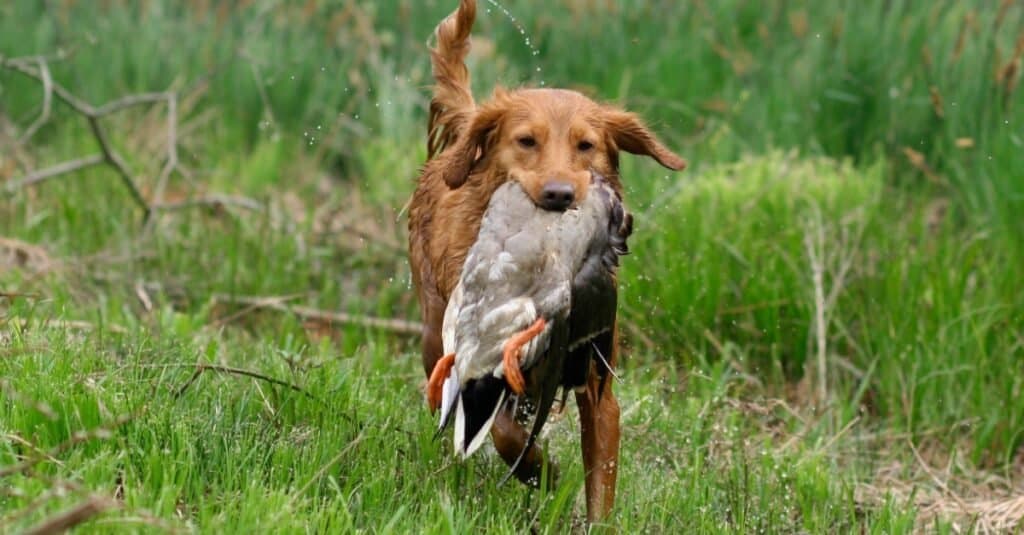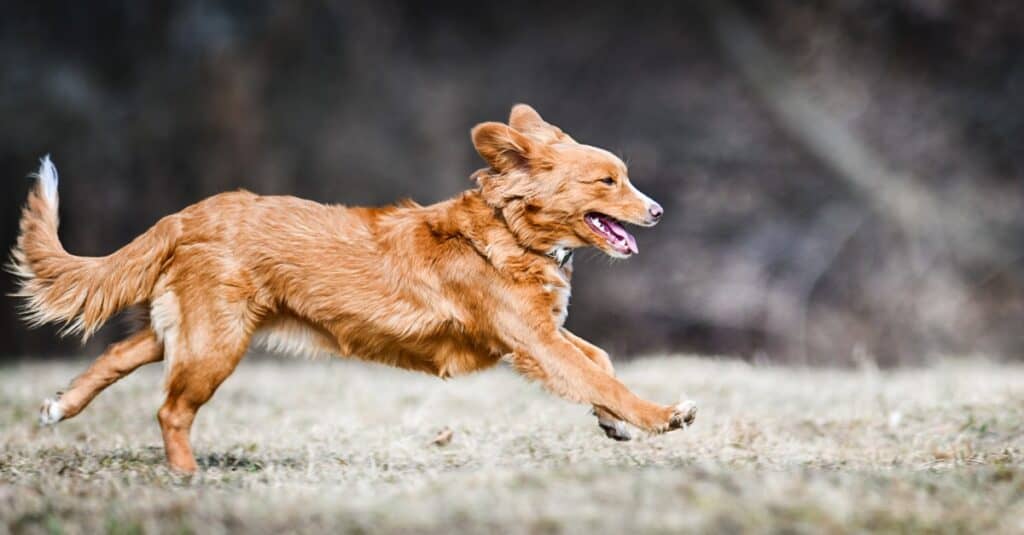A medium-sized dog bred for hunting, the Nova Scotia duck tolling retriever is a popular pet due to its charming appearance and pleasant personality. They are the smallest of the retriever breeds, similar to golden retrievers in coat type but not coloration.
This breed is named for its origin in Nova Scotia, as well as its unique ability to draw in ducks and geese. This allows for hunters to aim and secure successful hunts more readily. Nova Scotia duck tolling retrievers are able to achieve this by playing in the water. Their red coloration resembles that of a fox, with their white markings drawing the eyes of waterfowl. Because this behavior is uncommon in foxes, the birds may be curious enough to wander over, closer to gunshot range.
These energetic, intelligent dogs often rank in the top 100 for most popular breeds. As a result, you may be interested in bringing a Nova Scotia duck tolling retriever into your own home. Below, learn more about Nova Scotia duck tolling retriever prices, from the initial costs to vet bills, food, and more!
How Much Does a Nova Scotia Duck Tolling Retriever Cost?

Nova Scotia duck tolling retrievers cost an average of up to $4,000!
©dezy/Shutterstock.com
The exact price of a Nova Scotia duck-tolling retriever puppy depends on the breeder. It is important, however, to understand that when you buy from a reputable, ethical breeder, the price you pay for your puppy covers more than the puppy themselves.
Instead, you will also be paying for the care and testing that went into ensuring the parents were healthy, as well as care for your puppy prior to them entering your care. You’ll also be paying for your puppy’s early introduction to socialization and training. The fact that this breed is popular both as a working breed and a show breed also plays a role in their pricing.
The average price of a Nova Scotia duck tolling retriever is $1,700 to $4,000.
How Much Do Vet Bills Cost for a Nova Scotia Duck Tolling Retriever?

This is a generally healthy breed but may suffer from hip dysplasia or autoimmune diseases.
©iStock.com/Azoogle
How much the initial vet bills for your Nova Scotia duck tolling retriever will cost will also depend on the breeder. This is because costs will vary based on what your breeder has already provided your dog with, such as important shots and neutering. On average, the vet costs for a puppy in its first year range from as little as $100 to upward of $500. Castration may cost up to $500, and spaying may cost up to $1,500.
Overall, this breed is fairly healthy. However, they may be more prone to complications such as autoimmune diseases or hip dysplasia. This can increase healthcare costs later in your dog’s life. The price for hip dysplasia surgery may cost upwards of $7,000. If it affects both hips, this price can double. Other conditions may call for regular medication. However, choosing a reputable breeder with a healthy set of parents for your puppy can help minimize the risk of these problems, as is proper care throughout the early years of your puppy’s life.
How Much Does Food Cost for a Nova Scotia Duck Tolling Retriever?

The Nova Scotia duck tolling retriever requires around 2 to 3 cups of food each day.
©Krasula/Shutterstock.com
Nova Scotia duck tolling retrievers eat, on average, between 2.5 and 3 cups of dry food each day. For the best health possible for your pup, you’ll want to make sure that you are choosing a high-quality food brand packed with nutrients with minimal fillers or other ingredients.
The exact cost of food for your dog will depend on the brand and recipe. However, for most high-quality dog food brands, you can expect to spend between $25 and $50 per bag. However, since tollers will need their 2.5 to 3 cups split into two separate meals each day, if you have only one dog, a single bag should last for quite some time.
Other Costs to Consider
The initial purchasing cost, vet bills, and food are all the most common—and likely most hefty—costs of owning a Nova Scotia duck-tolling retriever. However, they are not the only costs to consider.
Other costs for owning any dog can include necessities such as water and food bowls, eyelashes, collars, and a kennel. You’ll also likely want to purchase a specific bed and toys for your dog. Depending on the breed and your experience with owning dogs, professional training may also be necessary to help your new dog live the best life possible with reduced anxiety and disobedience. Periodically, you may also need to invest in services such as grooming to maintain your dog’s appearance and health.
As a result, prior to purchasing your dog, you’ll want to make sure that you are prepared for both routine costs as well as variable, unpredictable costs.
The photo featured at the top of this post is © iStock.com/Bigandt_Photography
Ready to discover the top 10 cutest dog breeds in the entire world?
How about the fastest dogs, the largest dogs and those that are -- quite frankly -- just the kindest dogs on the planet? Each day, AZ Animals sends out lists just like this to our thousands of email subscribers. And the best part? It's FREE. Join today by entering your email below.
Thank you for reading! Have some feedback for us? Contact the AZ Animals editorial team.







